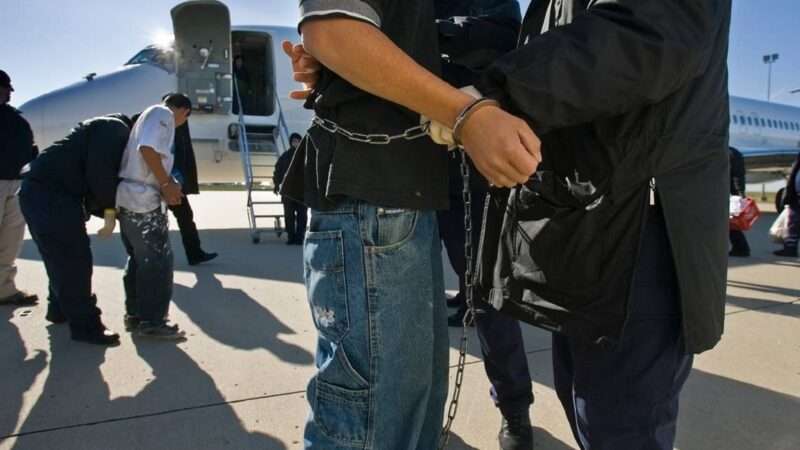
Whenever Donald Trump promotes some controversial idea or uses inflammatory rhetoric, many of his supporters offer some benign interpretation about what is really going to happen. But I find it far better to assume the worst—especially when it comes to the administration's plan to deport millions of illegal immigrants.
Trump made impressive gains among Latino men in particular, who backed him for the same economic and cultural reasons as other voters. But were they worried about the president-elect's stated deportation plans and the potential impact on legal residents of Mexican descent? According to some interviews I've seen, voters were sure the president would only target gang members and drug dealers.
I admire such optimism, but I figure Trump's call for mass deportations means that the incoming president intends on enacting a deportation plan with a focus on the word "mass." That word means "a quantity or aggregate of matter usually of considerable size." He and his allies have stated that they might declare a national emergency and use the military to do the roundups.
History should be a guide. The United States has on previous occasions engaged in similar policies. It did so during the Great Depression, when unemployment was rampant and the federal government didn't want to include braceros—laborers who were invited to the country to work the fields—in New Deal social programs, per History.com.
According to that report, the feds "deported over 1 million Mexican nationals, 60 percent of whom were U.S. citizens of Mexican descent." Yes, most of the deportees were U.S. citizens. It should come as no shock to Trump's conservative supporters that the government is prone to overreach. Limited and targeted government actions often cast a far wider net than promised. The government isn't always great at following its own rules.
Another mass-deportation program—known by the offensive title of "Operation Wetback," referencing a slur about Mexicans who got wet illegally crossing the Rio Grande—took place during the Eisenhower administration. That operation, which was backed by Mexican authorities who faced a labor shortage per the same report, didn't directly use the military. But the Border Patrol used military techniques—and it ensnared many U.S. citizens.
I doubt politicians who have engaged in rhetorical attacks on immigrants will worry about their hardships, but shouldn't they be concerned about what it will mean for U.S. citizens? During the 1950s operation, "Border agents raided Mexican American neighborhoods, demanded ID from 'Mexican-looking' citizens in public, invaded private homes in the middle of the night and harassed Mexican-owned businesses," according to Axios.
Our Constitution upholds due process. The government cannot simply grab people off the street. It needs to follow a legal process. Every accused person gets their day in court to make their case. As George Washington famously said, "Government is not reason, it is not eloquence—it is force."
Unleashing such force on a broad scale will not result in precise, humane, and just results. Government agents will conduct raids. Illegal residents often live among legal ones. Wide swaths of the population will get caught up in the dragnets.
Again, I'm not sure the administration will be too concerned about the travails of immigrants, even those who are here legally. But what will it mean for other Americans? Well, I've read a lot about the economic impact of removing perhaps millions of low-wage workers. Farm fields likely will go fallow. Food prices will rise. Food choices will diminish. Good luck finding gardeners and nannies. It will drive up the cost of construction and other economic drivers.
As someone who has hired construction workers in towns without large immigrant labor pools, I'm skeptical that large numbers of native-born Americans will jump at these newfound opportunities. The incoming administration embraces the Lump of Labor Fallacy—the idea that jobs are a zero-sum game where one person's job comes at the expense of another's job. In reality, more labor spurs economic growth and business development. That's how market economies work.
But forget economics, as this column is mainly about civil liberties. Even if you face no realistic fear of getting caught up in the broad deportation net, you might consider the downside of living in a country that's been highly militarized. There's a reason our forefathers placed limits on the military's role in domestic affairs. Perhaps the administration will find a legal workaround, but this still requires more checkpoints and snooping—whichever agency is behind them.
As Reason's Matthew Petti explained, "(A)ctually carrying out deportations on the scale Trump wants might require doubling the size of the Department of Homeland Security, which currently employs 222,539 employees total." One can't have it both ways—wanting to cut the size of the government while backing a plan that requires its massive expansion.
Maybe the president-elect will scale back the proposal, but history suggests that Americans ought to prepare for the worst-case scenario.
This column was first published in The Orange County Register.
The post Mass Deportations Are Bad for Everyone's Liberty appeared first on Reason.com.







